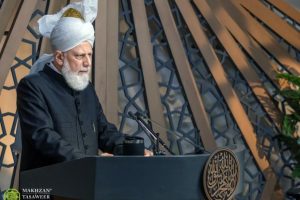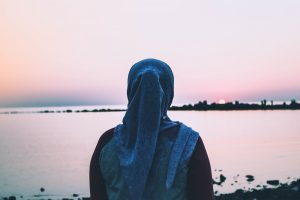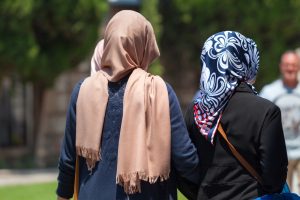
Labelled ‘the public face of Muslim women in Germany’, Khola Maryam Hübsch probably needs little by way of introduction to our German readers. Born and raised in a large family in Frankfurt as an Ahmadi Muslim, Khola enjoys the unique heritage of an Indian mother and a German father (the late Hadayatullah Hübsch), who converted to Islam.
Achieving a master’s degree in Journalism, Psychology and German Studies, Khola was well-equipped to pursue her career in Journalism and express her passion for Islam through her writing. Her books [1] and articles cover contemporary Islamic issues such as ‘Tolerance in Islam’, Islam and Feminism’, ‘Anti-Muslim Racism’ and ‘Right-Wing Populism and the German Fear of Islam’. They have been published nationwide by newspapers such as ‘Frankfurter Allgemeine Zeitung’, ‘Die Zeit’ and ‘Die Welt’.
In 2015, Khola was a member of the committee of experts on Human Rights at the German Bundestag (German Federal Parliament). She currently serves on a Management Board (Rundfunkrat) for the State of Hessen, supervising media content. Khola is also a visiting lecturer to university students and has provided public interviews discussing Islam on various national television networks.
Her influence is transcending borders as she has also been awarded the ‘Monoreligioni Award’ in 2019 for ‘standing up against injustice, persecution and abuse,’ by the Italian Sociological Association (AIS). All this she has achieved whilst marrying and raising four children. ‘The Review of Religions’ Women’s Section Editor, Munavara Ghauri, had the pleasure to speak to Khola about her life and values.
MG: Welcome to The Review of Religions Magazine Khola. Thank you for taking the time out to talk to us!
KH: Thank you for having me. It’s an honour!
MG: Khola, you are of German/Indian heritage. Your late father was German (Hadayatullah Hübsch) and your mother (Sadiqa Sultana) is Indian (Qadian). Quite literally, they lived worlds apart! How did their marriage come about?

KH: My father embraced Islam after having some spiritual experiences with Allah. He had previously been an activist, a man of letters and a hippy, and had nothing to do with Islam. Since Allah Himself guided him to Islam, the Third Caliph, Hazrat Mirza Nasir Ahmad (rh) gave him the name ‘Hadayatullah’ meaning the ‘one guided by Allah’.
My father dreamt that a ‘dervish’ (one of the 313 companions left to safeguard the town of Qadian in India, the then centre of the Ahmadiyya Muslim Community at the time of Partition in 1947) gave him a ring. So he went to Qadian and married my mother, the daughter of the dervish from his dream. Also, my mother had already seen my father in a dream. That was what kept my parents together above all else, their spiritual relationship with Allah. It was the bond that made their love blossom. I was thus fortunate to be born an Ahmadi Muslim, Alhamdolillah [All praise belongs to Allah].
MG: What an inspiring story of Allah’s Guidance at a very personal level for both your parents regarding their marriage.

MG: I have read that the German Muslim population is currently around 6/7%. Presumably, it was even less in the 1980s during your childhood. What was it like growing up as a German Muslim?
KH: I was the only one in my class, and later also in my school and in my study programme, who wore a headscarf. In combination with my catchy German last name, this made me stand out even though I was rather shy. I realised that I was the face of Islam for those around me; they didn’t know any other Muslims. This helped me to become self-confident, because I felt the responsibility to let the beauty of my religion shine, to counteract all the darkness that they associated with Islam.
MG: So, it seems you felt quite a responsibility to personally represent Islam well from a young age. By your good personal conduct, you tried to show others what Islam really teaches. It reminds me that Hazrat Mirza Ghulam Ahmad (as) , the Promised Messiah (as) and Founder of the Ahmadiyya Muslim Community said:
‘The Holy Qur’an clearly forbids the use of force for the spread of the faith and directs its propagation through its inherent qualities and the good example of the Muslims.’ [2]
Moving on to your career, what then led you to pursue journalism?
KH: A formative event of my youth was the founding of MTA (Muslim Television Ahmadiyya – the first 24-hour Muslim satellite channel launched by the Ahmadiyya Muslim Community in 1995). I gained my first journalistic experience there and also wrote for the Ahmadiyya Community magazines and did literary work. I wanted to share with the world the fascinating experiences and insights I was allowed to make through Islam. This was a deep, heartfelt desire in me, and the mass media seemed to be an effective way to do it.
MG: So, what advice would you give to other young Muslim women who may be considering a career in journalism?
KH: Read, read, read and write a lot! Gain knowledge from many areas of life. Develop a genuine interest in people. As a journalist, I want to help others gain the knowledge that will change their lives. Empathy and a strong sense of justice and truth are also important. The prerequisite for this is to sharpen one’s judgment. This can only be done with Allah’s help.
MG: You have written prolifically on topics like ‘Islam and Tolerance’ or ‘Love in Islam’. These words are rarely seen together in print! How did readers respond to your articles?
KH: I got a lot of feedback and it varied a lot. There are hate comments and criticism but there are also people who write to me that they have started to study Islam and are grateful for this new perspective. I am especially touched by messages from readers who tell me how they have found their way to God through my articles or books. Some even become Muslim or Ahmadi Muslim. That is the most beautiful feedback and for that every effort is worthwhile.
MG: Clearly, your written word is having a profound impact on certain individuals. You have written two books relating to Islam. Can you briefly tell us what they are about and why you felt a need to write them?
KH: My first book was meant to be a response to common criticisms of Islam. I started with the chapter on women but it became so long that it was enough for the whole book. It deals with feminism and why Islam brings real gender equality – also in light of current sociological findings.
After that, I wrote a volume of essays about the big questions: God in times of atheism, love in times of capitalism, beauty in times of Instagram, death in times of materialism…Always against the background of personal experiences with Allah and Islamic sources. Because many people have not received these fascinating insights into the wonderful world of Islamic wisdom. They do not know Allah. This is very painful for me, so I feel the urge to share insights, especially with those who do not know this world and believe it does not exist. It is an attempt to show someone who does not see what you experience yourself. To help a blind person to see.
MG: Your passion for sharing the teachings of Islam is palpable, Khola. Have you any plans for further books?
KH: Yes, I’ve had the idea for a novel floating around in my head for a while, and in my mind I’ve also written more essays, but they still need to be put on paper. I have also written an Islamic children’s book and am looking for someone to illustrate it. So, if there are any good illustrators who are interested, please feel free to contact me!
MG: How exciting! As a mother of three, I also felt that there was a shortage of Islamic books focusing on Muslim children. However, in the past few years, I feel our Community, the Ahmadiyya Muslim Community, has considered this issue and published some great little books for children … but there is still a need for more. Can you share the subject of your children’s book?
KH: The title is ‘The Children from Nur Mosque’ (Wir Kinder von der Nuur-Moschee). It is designed for 9 -12-year-old children. It covers the lives of a group of Muslim children over a year and is in the format of short stories. It retells their experiences as Muslims and little incidents such as the acceptance of prayers by Allah Almighty. It is very much inspired by real experiences I made in my childhood and with my children.
MG: It sounds interesting Khola. Short, bite-size stories are always popular, and I think that particular age group has fewer Islamic books written to cater for them. You also offer lectures on Islam to universities throughout Germany. Your audience can consist of up to 1,000 students. Do you ever get nervous speaking in public? Does it come naturally or is it a skill that you have developed?
KH: Although I was shy, I was already able to give rousing speeches in my school days. Nevertheless, it’s also a matter of practice: The audience got a little bigger over time, so I grew into it. Then, when I had an audience of millions on a TV talk show, I actually blacked out once at the beginning. But I immediately felt Allah’s help because I realised how I was responding and no one noticed my blackout. So I am not worried because everything is in Allah’s Hand, He is The Best Helper!
MG: Very true, but I do admire your courage to put yourself in the public eye! You are currently on a Management Board (Rundfunkrat) for the State of Hessen, supervising all media content. It sounds like quite an influential role, where you potentially help prevent the distortion of Islamic teachings online.
KH: Yes, in Germany there is a public broadcasting service and everyone has the opportunity to lodge programme complaints. This also applies to reporting on Islam. The Broadcasting Council examines these complaints and in this context, I can contribute my expertise on Islamic topics. Nevertheless, it is important for viewers to send in their complaints if something strikes them as wrong. Only when everyone takes action, will producers become aware of the need to question their coverage of Islam.
MG: You also contribute to nationwide TV broadcasters and newspapers which are viewed and read by millions of people. Even the German Bundestag (Parliament) consulted you. How have you developed your Islamic knowledge and understanding? If our readers wish to increase their knowledge of Islam, what resources would you recommend?
KH: When I was a child, my father often took me to religious question-and-answer sessions that he led. He learnt a lot from the Fourth Caliph, His Holiness, Mirza Tahir Ahmad (rh). Later, I started reading the books of the Community and listened to everything I could find from Huzoor (aba) (His Holiness). As Ahmadis, we are so blessed by Khilafat (spiritual leadership), to be regularly fed with spiritual food for our souls. Books remain the most important source. While cooking and cleaning, I like to listen to podcasts and videos simultaneously. But it’s also good to just engage in the remembrance of Allah. All knowledge remains hollow without spiritual progress.
MG: You have been called ‘the public face of Muslim women in Germany’ by German Broadcaster ARD. That’s quite a title! How do you feel about representing Muslim women in your country? Is wearing the Hijab (veil) in Germany challenging?
KH: Every woman who wears a hijab also carries the responsibility of being perceived as the face of Islam. When I started wearing the hijab as a teenager, I was afraid of being ostracised. But I said to myself, “Alaisallahu bi kafin abdohu” i.e., “Is Allah not enough for His servant?” (A revelation of the Promised Messiah [as]). Whoever has Allah as a friend, what else do they have to fear?
MG: Yes, indeed. You seem to have a very strong faith Khola, one that has shaped every aspect of your life. For example, you had an arranged marriage in your early 20’s. Such a concept is probably quite alien to native Germans. How do you explain arranged marriages to your friends and colleagues?
KH: I don’t like the term “arranged marriage” because there are many false associations with it. It is not the parents or others who arrange the marriage, it is Allah. Family and friends support us by making suggestions and assisting us with prayers during the decision-making process. As Muslims, we have the great advantage of not being left alone to make this important life decision. Especially as a woman, it is an advantage that the man (husband) is put in charge from the beginning and has to take responsibility. He can’t just frivolously exploit a woman for his short-term fun. I think that Islam is a very woman-friendly religion – you can see that among other things, in the rules for choosing a partner and getting married.
MG: It is true that the Islamic system of marriage is designed to protect women from being exploited by teaching that the parents/guardian of a girl share the responsibility of finding her a life-partner that suits her. Furthermore, we as Muslims know that Islam has clearly and emphatically forbidden forced marriages. The Holy Prophet of Islam (sa) taught, ‘Give women in marriage to men they approve of.’ [3] He also quite beautifully summed up the significance of good behaviour towards one’s wife when he said: ‘’The best of you are those who treat their wives best.’ [4]
Islam also teaches men to quite literally ‘man-up’ and bear the financial burden of paying all the household bills to support their wives and children. In fact, I don’t think any other religious scripture or Prophet has so repeatedly stressed the rights of wives.
On another topic, I wanted to ask that being a native German as well as a Muslim, do you think there is any overlap between Islamic values and the values in German culture?
KH: Oh yes, there are many overlaps! Basic virtues like honesty, sincerity, discipline, diligence, incorruptibility and sense of duty are highly regarded here. My husband grew up with this upbringing in Fulda, a very traditional German town. When we were looking for our apartment, we were afraid of being discriminated against among the many other applicants because of our being Muslim. But when the landlord heard that my husband was from Fulda, he was quickly convinced by us. We got the apartment and showed him that these German virtues are also deeply Islamic.
MG: How interesting! It also reinforces the Muslim belief that Islamic teachings are perfectly aligned with human nature as Allah Almighty has stated in the Holy Qur’an:
‘This day, have I perfected your religion for you and completed My favour upon you and have chosen for you Islam as religion.’ [5]
MG: Khola, you have been blessed with four children. What are the values you most want to instil in them?
KH: I would like them to be honest and God-fearing and with love and empathy for all creatures.
MG: And finally Khola, the all-important question about food! If I were to visit Germany again (I have briefly visited in the past), what dish would you recommend that I try?
KH: ‘Königsberger Klöpse’ (meatballs with potatoes) is a traditional dish in Germany that’s tasty! However, be sure to order the lamb meatballs and not the pork ones!
MG: Noted! Thank you, Khola. It has been fascinating to learn about your unique heritage, your writing and the depth of your faith. It seems that you are positively impacting your native Germany by introducing people to the true teachings of Islam. We wish you all the best in your future endeavours and request that you think of translating your works into English, so more of us can benefit from them!
ENDNOTES
[1] Khola has published 2 books in German. They are:
“Unter dem Schleier die Freiheit – was der Islam zu einem wirklich emanzipierten Frauenbild beitragen kann”, (Freedom Under the Veil – What Islam can Contribute to a Truly Emancipated Image of Women’) 2014.
“Rebellion der Sehnsucht – Warum ich mit den Glauben nicht nehmen lasse” (Rebellion of Longing- Why I Won’t Let My Faith be Taken Away.’) 2018.
[2] The Essence of Islam, Vol II, Trans Ch. Muhammad Zafrulla Khan, Islam International Publications Ltd, 2004, p325
[3] M Zafrulla Khan, Wisdom of the Holy Prophet, Unwin Brothers Ltd, 1981, p8
[4] Ibid, p11
[5] Holy Qur’an (Ch.5-V.4)




Add Comment